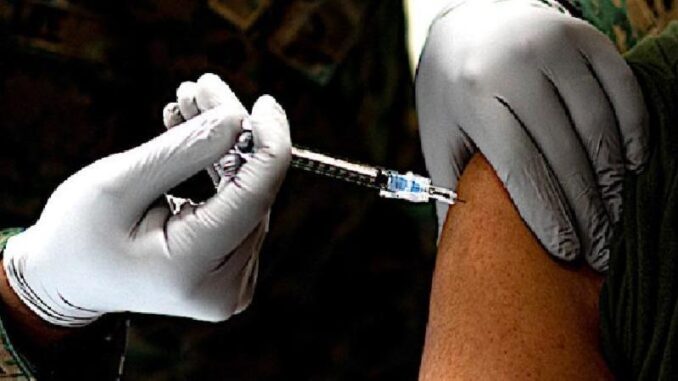
Hours before the CDC panel’s approval Tuesday of the Pfizer vaccine for children 5-11, the British Medical Journal published an article featuring a whistleblower’s charge that poor practices at a contract research company helping to carry out Pfizer’s COVID-19 vaccine trial last fall may have compromised data integrity and patient safety.
The whistleblower, Brook Jackson, was a regional director in Texas who was employed at the research organization Ventavia Research Group. After her company ignored her complaints, she emailed the U.S. Food and Drug Administration. On the same day she sent the email, she was fired.
Jackson told The BMJ that during the pivotal Phase III trial, Pfizer falsified data, unblinded patients, employed inadequately trained vaccinators and was slow to follow up on reported adverse events.
The BMJ said she has provided dozens of internal company documents, photos, audio recordings and emails to back her claims.
During the fall of 2020, The BMJ noted, Pfizer’s chairman and CEO, Albert Bourla, released an open letter to the people of the world anticipating the launch of a vaccine that would end the pandemic.
“As I’ve said before, we are operating at the speed of science,” Bourla wrote.
But The BMJ said that speed may have come at a high cost.
“Staff who conducted quality control checks were overwhelmed by the volume of problems they were finding,” the journal said.
The BMJ is a weekly, peer-reviewed medical trade journal, published by the trade union the British Medical Association. However, The BMJ has editorial freedom from the BMA. Founded in 1840, it’s one of the world’s oldest general medical journals.
On Tuesday, a Centers for Disease Control and Prevention vaccine panel unanimously recommended emergency use authorization for Pfizer’s vaccine doses for children ages 5 to 11.
CDC Director Dr. Rochelle Walensky, who will make the final decision, is expected to accept the recommendation by the Advisory Committee on Immunization Practices.
With Walensky’s approval, which could come late Tuesday, vaccinations for young children could begin immediately.
The FDA approved the Pfizer shot for kids last Friday, one week after an FDA advisory panel voted 17-0, with one abstention, to recommended it, despite acknowledging the lack of safety data and the nearly 100% survival rate for children from infection.
During the FDA advisory committee meeting, Dr. Eric Rubin, editor-in-chief of the New England Journal of Medicine, expressed the concern of many members about possible severe side effects that cannot yet be measured. He concluded, nevertheless, there was no other way forward.
“We’re never going to learn about how safe the vaccine is unless we start giving it,” he said. “That’s just the way it goes.”
On Sunday, Dr. Ben Carson, the acclaimed former Johns Hopkins pediatric neurosurgeon and HHS secretary, said the Biden administration’s move to vaccinate young children for COVID-19 amounts to a “giant experiment,” arguing there is no sufficient data to determine the long-term risks posed by the shots.
Here some of the other health experts who believe children should not be vaccinated:
- Dr. Martin Kulldorf, professor of medicine at Harvard Medical School, member of FDA and CDC scientific advisory committees: “I don’t think children should be vaccinated for COVID. I’m a huge fan of vaccinating children for measles, for mumps, for polio, for rotavirus, and many other diseases, that’s critical. But COVID is not a huge threat to children.”
- Dr. Harvey Risch, professor of Epidemiology in the Department of Epidemiology and Public Health at the Yale School of Public Health and Yale School of Medicine, on what he would do if schools mandate the vaccine: “If the child has chronic conditions that make their risk appreciable, then there is reason that they should be considered for vaccination. Other than that, if it were my child, I would (remove them from public school and) homeschool them.”
- Dr. Sunetra Gupta, infectious disease epidemiologist and professor of theoretical epidemiology at the Department of Zoology, University of Oxford: “At this stage, we should limit vaccination to the vulnerable and not target children (and possibly other young people) in COVID-19 vaccination strategies.” Children “are unlikely to benefit from COVID-19 vaccination directly,” “the collective benefit would likely be very limited” and “we have already imposed very large costs on children during this pandemic through indiscriminate restrictions, using them as mere means to others’ ends.
- Dr. Robert Malone, virologist and immunologist known for his work developing mRNA vaccine technology: “There is absolutely no scientific or medical justification for vaccinating children, in my opinion.”
In early October, three Pfizer scientists were captured on hidden camera a Project Veritas investigation admitting, contrary to the claims of Dr. Anthony Fauci and other public health officials, that natural immunity is superior to the immunity afforded from COVID vaccines.
In Part 1 of Project Veritas’ series on the vaccines, an employee of the U.S. Department of Health and Human Services presented video recordings of colleagues privately voicing alarm about the safety of the vaccines, alleging a cover-up of “evil at the highest level.” In another installment, two Johnson & Johnson officials said children don’t need the vaccine and it poses the risk of “unknown repercussions down the road.”
Pfizer scientist Rahul Khanke said employees are “bred and taught” to insist that the “vaccine is safer than actually getting COVID.” He said “we cannot talk about this” in public.
